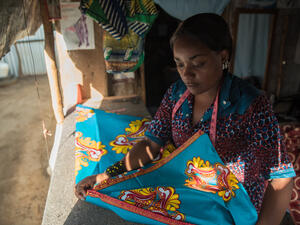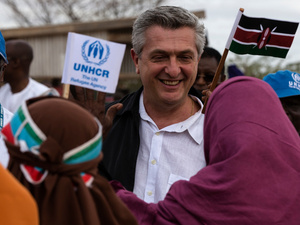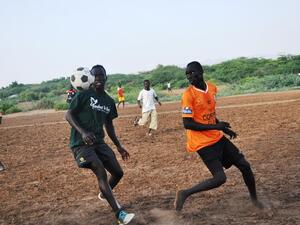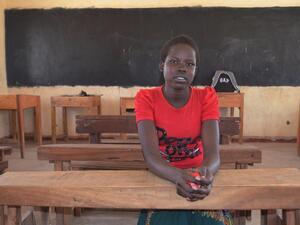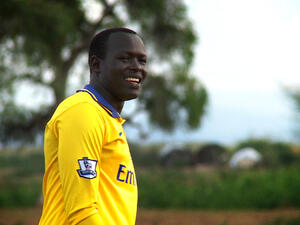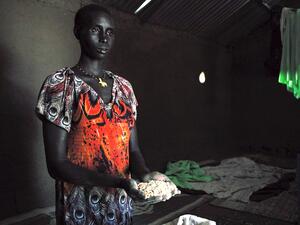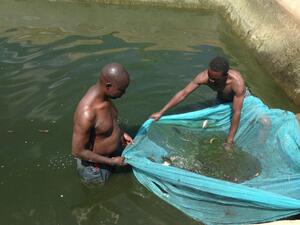Childhood friends find enduring love after war and exile
Childhood friends find enduring love after war and exile

Francis Akech Dol and Elizabeth Yon Appel found each other at Kakuma refugee camp – and then fell in love.
KAKUMA REFUGEE CAMP, Kenya, December 19 (UNHCR) - As children they played hide-and-seek in their village. They told stories about the animals in the forest. They mimicked the way the lion attacks. They were not of the same blood, but during those moments they felt themselves to be as brother and sister.
Now Francis Akech Dol, 32, and his wife Elizabeth Yon Anpei, 27, are married and living in the protection of the Kakuma refugee camp in north-west Kenya. Their story is about two people who fell in love in defiance of the forces of war, exile and family violence.
Their journey was not an easy one. In 1991 war arrived at Yeru in South Sudan. Elizabeth fled with her parents across the border, first to Ethiopia and later to Kakuma. Her father was killed during the journey. Francis stayed in southern Sudan for another decade, enduring more attacks before fleeing south into Uganda in 2001. From there, a trader took him to Malaba on the Kenyan border.
He made his way in 2002 to Kakuma, where he met Elizabeth again and fell instantly in love. At first she didn't remember her childhood friend, but Francis couldn't forget. "I felt very delighted by her," he said. "I asked her to go out with me. We shook hands and watched a football game in the camp. My heart was beating so strongly I could not control it." Elizabeth too was delighted. The couple could not see enough of each other.
Francis arrived just in time for Elizabeth. The previous decade had suffocated her. She was forced to marry at age 14 in exchange for 12 cows. By age 15 she had her first child. She describes her husband as a drunkard who beat her frequently. She had a second child by him and the beatings grew worse. "He used to beat me every day. He came home and he beat me," she said. "He just came and started slapping and kicking for nothing."
Finally the man discarded her and Elizabeth returned home to her family, broken physically and mentally. "My heart was a stone," she said. "But then I saw Francis and it became a very new flower. It was blooming again."
"What would you do for the love of another?" asked Francis, in front of his mud brick home. During the three years that he dated Elizabeth, her family threatened him. He came from a poor family and didn't have money to pay the 300-cow dowry her family demanded. In fact he had no cows.
Meanwhile Elizabeth's family put pressure on her to marry someone else. "My parents said, 'This man is a poor man. We will give you a rich man.' I told them that love is not money and I love Francis." But they ignored her words and warned Francis that if he came together with their daughter, he would be killed.
The couple secretly married in 2006, but on their first night together Elizabeth's family beat her so severely she was hospitalized. Her uncle held a stick in his hand and hit her in the face and her teeth fell out. Meanwhile her brother kicked her. She was knocked unconscious. Then they turned their wrath on Francis, beating him as well. UNHCR moved the couple to the camp's protection area where they now live under constant security.
In 2007 the couple had their first child. They named him Boston, named because of Francis's fondness for the North American city he has never seen. Since then they have had two other children and a fourth is on the way.
After South Sudan declared its independence last July, Francis and his wife had the opportunity to go home. But it was an impossible dilemma. He could go back to the freedom of home and the protection of his family. But to do so would invariably lead to violence. "My parents will fight against her family. There will be destruction and people will die. My wife could die," Francis said. "I do not want that for any of us. I refuse."
Now the conflicted father works teaching English and mathematics to children in the camp. His family has applied for resettlement in a third county. During his free moments he likes to paint different figures on the side of his mud-brick home. There are paintings of elephants, lions and cattle. "I want to teach my children about the animals in the forest," he says. "I want to teach them the way the lion attacks."
By Greg Beals in Kakuma Refugee Camp, Kenya. Beals is a writer and journalist now on assignment in East Africa for UNHCR.



